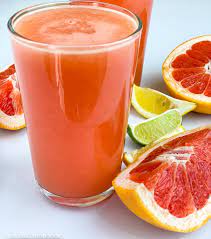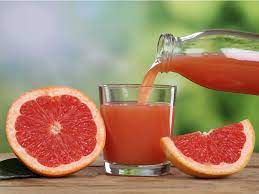Grapefruit juice is a popular citrus fruit juice made from the pulp of grapefruits. It is known for its refreshing and tangy flavor. Grapefruits are a type of citrus fruit that come in various varieties, including white, pink, and red grapefruits, each with slightly different flavors and sweetness levels. Grapefruit juice has a tart and slightly bitter taste, which can vary depending on the variety of grapefruit used. Pink and red grapefruits tend to be sweeter than white grapefruits.
Grapefruit juice is a good source of essential nutrients, including vitamin C, vitamin A, and potassium. It also contains antioxidants and dietary fiber, which can contribute to a healthy diet. Consuming grapefruit juice is often associated with various health benefits, such as supporting the immune system due to its high vitamin C content and potentially aiding in weight loss due to its low calorie and high fiber content. Some studies have also suggested that certain compounds in grapefruit may help with cholesterol management.
It is important to note that grapefruit juice can interact with certain medications. It contains compounds that can affect the way your body metabolizes drugs, potentially leading to increased or decreased drug effectiveness. If you are taking prescription medications, especially those for heart conditions or cholesterol, it’s advisable to consult with a healthcare professional about grapefruit juice consumption.
Grapefruits juice is commonly used in various culinary applications. It can be enjoyed on its own as a refreshing beverage, mixed with other fruit juices, or used as an ingredient in cocktails and smoothies. It’s also used as a flavoring agent in salad dressings, marinades, and desserts.
Grapefruits juice is a versatile and healthy beverage option, but it’s essential to be aware of any potential interactions with medications and consume it in moderation as part of a balanced diet.
The Economic Importance and Uses of Grapefruit Juice

Grapefruit juice has several economic importance and uses, both in terms of its consumption and commercial applications.
Here are some of the key economic aspects and uses of grapefruit juice:
1. Breakfast Staple: Grapefruit juice is a popular choice for breakfast beverages due to its refreshing taste and high vitamin C content. Its consumption contributes to the beverage industry’s revenue.
2. Nutritional Value: Grapefruit juice is rich in vitamins (especially vitamin C), minerals, and antioxidants. It is often consumed for its potential health benefits, such as boosting the immune system and aiding in weight loss.
3. Flavoring Agent: Grapefruit juice is used as a flavoring agent in various food products, including salad dressings, sauces, and marinades, enhancing the taste of these items.
4. Cocktails: Grapefruit juice is a key ingredient in many cocktails, such as the Paloma and Greyhound, contributing to the beverage industry’s revenue.
5. Fragrances and Toiletries: The pleasant citrus scent of grapefruit is often used in perfumes, soaps, and toiletries. This creates demand for grapefruit extracts and oils in the cosmetic industry.
6. Drug Interactions: Grapefruit juice contains compounds that can interact with certain medications, affecting their absorption and efficacy. This has economic implications for pharmaceutical companies that need to study and address these interactions.
7. Biological Studies: Grapefruit juice is used in scientific research for its potential health benefits, including its impact on drug metabolism, cardiovascular health, and cancer prevention.
Read Also: Grapefruit Blossoms: Economic Importance, Uses and By-Products
8. Fruit Production: The cultivation of grapefruit for juice production contributes to the agricultural sector’s economy in regions where grapefruits are grown.
9. Export Market: Grapefruit juice is often exported to international markets, generating income for countries that produce it in significant quantities.
10. Nutritional Supplements: Grapefruit juice extracts and supplements are available for purchase, marketed as health supplements that may offer various health benefits.
11. Canned and Bottled Products: Grapefruit juice is used as an ingredient in the production of canned and bottled fruit juices, contributing to the food processing industry’s revenue.
12. Crop Improvement: Research into grapefruit varieties and farming techniques can lead to improved crop yields and quality, benefiting the agricultural sector.
The Products and By-products That Can Be Derived From Grapefruit Juice
Grapefruit juice is a versatile ingredient that can be used in various food and beverage products, as well as in the production of certain by-products.
Here is a list of some of the products and by-products that can be derived from grapefruit juice, along with brief explanations:
1. Fresh Grapefruit Juice: This is the primary product obtained by extracting juice from fresh grapefruits. It is a popular beverage consumed for its refreshing taste and nutritional benefits.
2. Frozen Concentrated Grapefruit Juice: To create this product, grapefruit juice is concentrated and then frozen. It is used as a base for reconstituting grapefruit juice by adding water, or it can be used in the production of various beverages and food items.
3. Grapefruit Juice Concentrate: Concentrated grapefruit juice is used in the production of many food and beverage products, including juices, drinks, and desserts. It’s also a common ingredient in sauces, marinades, and salad dressings.
4. Grapefruit Flavored Beverages: Grapefruit juice is often used as a flavoring agent in various beverages, including carbonated sodas, flavored water, and cocktails. These products may contain natural or artificial grapefruit flavor.
5. Grapefruit Extract: Grapefruit extract is derived from grapefruit seeds and pulp. It is used for its potential health benefits and as a natural preservative in various cosmetic and skincare products.
Read Also: Grapefruit Leaves: Economic Importance, Uses and By-Products
6. Grapefruit Oil: Grapefruit essential oil is extracted from the peel of the fruit. It is used in aromatherapy, perfumes, and skincare products due to its citrusy aroma and potential therapeutic properties.
7. Grapefruit Pulp: After the juice is extracted, the leftover pulp can be used as a dietary fiber source in food products like jams, marmalades, and baked goods.
8. Grapefruit Zest: The outer zest of the grapefruit peel contains aromatic oils and can be used as a flavoring agent in cooking and baking. It’s often added to dishes, desserts, and cocktails for its citrusy aroma.
9. Grapefruit Peel: Grapefruit peel can also be candied or preserved to create snacks, toppings, or garnishes for desserts and cocktails.
10. Grapefruit Seed Extract: This extract is derived from grapefruit seeds and is believed to have antibacterial and antifungal properties. It is used in dietary supplements and natural health products.
11. Citrus Bioflavonoids: Grapefruit contains bioflavonoids that have antioxidant properties. These compounds can be extracted and used as dietary supplements for their potential health benefits.
12. Citrus Pectin: Pectin, a natural thickening agent found in grapefruit, can be extracted and used in the production of jams, jellies, and as a gelling agent in food processing.
13. Animal Feed: The by-products of grapefruit processing, such as peels and pulp, can sometimes be used as animal feed, providing additional value and reducing waste.
In conclusion, grapefruit juice serves multiple economic purposes, ranging from its consumption as a popular beverage to its use as an ingredient in various food and beverage products. It also has applications in the pharmaceutical, cosmetic, and agricultural sectors, making it a valuable commodity with economic significance.
Read Also: Chicken Brooder House – Complete Chicks Brooding Care Guide

